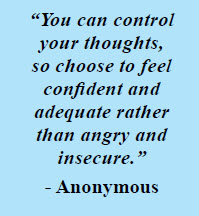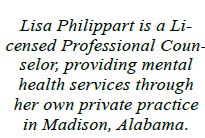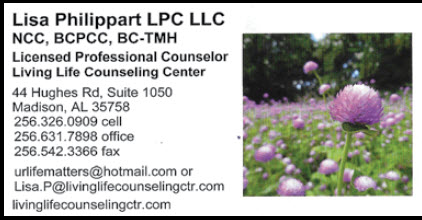 By: Lisa Philippart
By: Lisa Philippart
A good way to never feel confident is to always be failing. And a good way to always be failing is to always be trying to control the uncontrollable. I realize that it is often hard to distinguish what we can control from what we can’t…especially if we really want to be able to control things. Here’s an example: You might really struggle when your spouse is feeling grumpy. You might want to do something to “help” him be less grumpy. But realistically how much control do you have over his mood? You could give him some advice. (From experience, giving advice about mood tends to backfire!) Not only can you not make him feel better, but he will also probably feel worse because it seems like you are trying to fix him. And nobody likes feeling like a problem that needs to be fixed. Now this doesn’t mean that we can’t or shouldn’t try to help or support others. Here are some options: try validating struggles rather than trying to fix them, give him space to process, or even reflect on what emotions are stirred up in you. In any case, the critical difference is that there is no expectation of you being able to control the outcome. As a result, your self-worth and confidence are tied to something you can’t control.
 We know that second-guessing and problems with confidence go hand in hand when we see it in other people. And we assume that it’s low confidence causing the second -guessing. But I encourage you to consider that second-guessing can also lead to low confidence. When you’re constantly second-guessing yourself, you’re effectively communicating to your own mind that you’re not reliable or trustworthy — that your decisions and instincts are not dependable. Are you thinking to yourself, “But I don’t want to be over-confident, appearing arrogant and making big mistakes.” If you are the kind of person who seriously struggles with low confidence and chronic second-guessing, you are probably SO far away from over-confidence being an issue! Genuine self-reflection and constructive self-talk are good things. But they are very different from the habit of reflexive second-guessing. Here is an option: stop second-guessing yourself in the moment and schedule time to do it deliberately. Pause and plan to spend 20-30 minutes later in the day, if possible, to reflect upon and evaluate your decision. Confidence and humility are not mutually exclusive.
We know that second-guessing and problems with confidence go hand in hand when we see it in other people. And we assume that it’s low confidence causing the second -guessing. But I encourage you to consider that second-guessing can also lead to low confidence. When you’re constantly second-guessing yourself, you’re effectively communicating to your own mind that you’re not reliable or trustworthy — that your decisions and instincts are not dependable. Are you thinking to yourself, “But I don’t want to be over-confident, appearing arrogant and making big mistakes.” If you are the kind of person who seriously struggles with low confidence and chronic second-guessing, you are probably SO far away from over-confidence being an issue! Genuine self-reflection and constructive self-talk are good things. But they are very different from the habit of reflexive second-guessing. Here is an option: stop second-guessing yourself in the moment and schedule time to do it deliberately. Pause and plan to spend 20-30 minutes later in the day, if possible, to reflect upon and evaluate your decision. Confidence and humility are not mutually exclusive.
Boundaries are an expression of self-respect. When you set and enforce healthy boundaries, you’re communicating to the world (and yourself) that you matter… that your values, wants, needs, and opinions are important, and worth honoring and protecting. And this deep self-respect is the foundation for healthy confidence. Porous boundaries may allow for short-term relief, but the long-term cost is worth noticing. By not enforcing your boundaries, you sacrifice what you want and need for what someone else wants. When you get in the habit of sacrificing your own legitimate wants and needs for those of other people, your self-respect and confidence deteriorate. By sticking to your boundaries long-term, you send a powerful message to your own brain: I matter. And this isn’t just something that you say to yourself every morning in front of the mirror. This is a value that you are willing to stand up for and sacrifice for. It’s real. And the result of that real commitment to yourself is deep and lasting self-respect and the confidence that comes with it.
 Finally, you can be critical without criticizing. Being critical can be just an acknowledgement of a fault or mistake. Criticizing yourself in response to a mistake often creates an unrealistic view of yourself that is almost always too negative. Try acknowledging that a mistake was made (honest and realistic) without beating yourself up for it. The goal is to have the mental and emotional bandwidth to actually think of a productive way forward rather than getting mired in a pit of self-pity and judgment. So, the next time you make a mistake, ask yourself this question: Is there a way to recognize the mistake I made without criticizing myself? And the follow-up to this is to then let the mistake go! If you are constantly reliving past mistakes in your head, it’s going to be tough to feel confident about yourself in the present. Give yourself permission to let it go and move forward.
Finally, you can be critical without criticizing. Being critical can be just an acknowledgement of a fault or mistake. Criticizing yourself in response to a mistake often creates an unrealistic view of yourself that is almost always too negative. Try acknowledging that a mistake was made (honest and realistic) without beating yourself up for it. The goal is to have the mental and emotional bandwidth to actually think of a productive way forward rather than getting mired in a pit of self-pity and judgment. So, the next time you make a mistake, ask yourself this question: Is there a way to recognize the mistake I made without criticizing myself? And the follow-up to this is to then let the mistake go! If you are constantly reliving past mistakes in your head, it’s going to be tough to feel confident about yourself in the present. Give yourself permission to let it go and move forward.
By: Lisa Philippart
Licensed Professional Counselor







